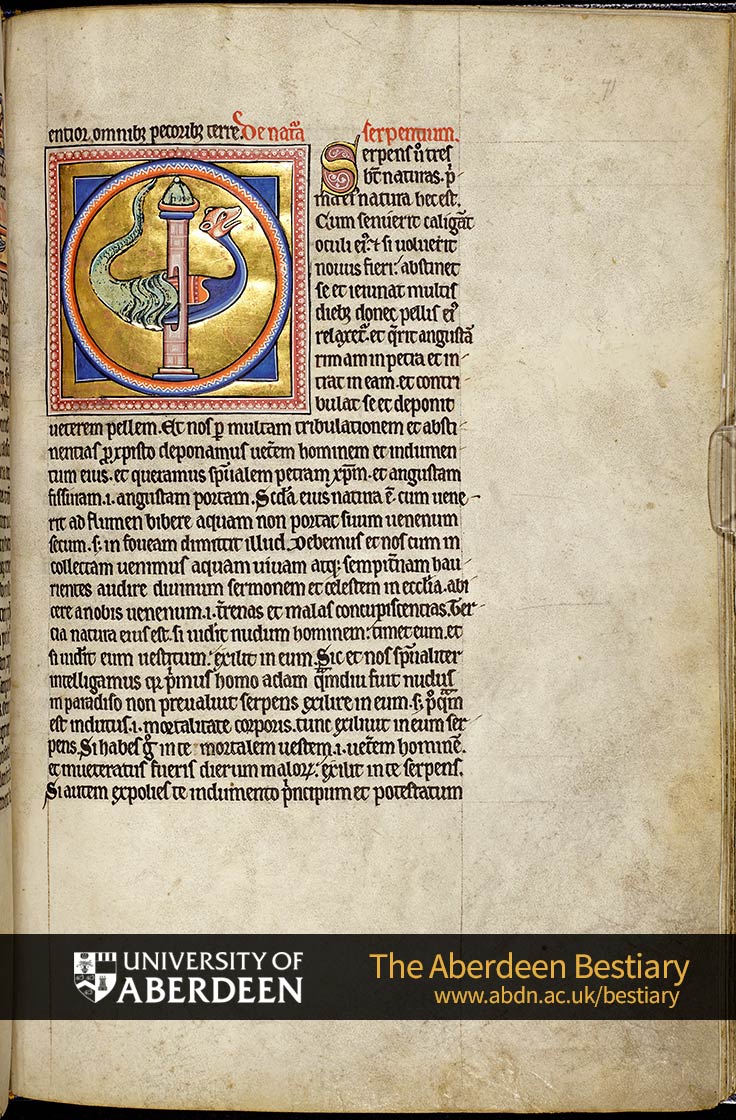Folio 71r - the newt, continued. De natura serpentium; Of the nature of snakes.
more subtle than any beast of the field' (3:1).
Of the nature of snakes
The snake has three characteristics.
The first of these is that when it grows old, its eyes grow dim; if it wants to regain its youth, it fasts for many days until its skin grows loose; then it seeks out a narrow crack in a rock, enters it, and scrapes through, sloughing off its old skin.
Let us, too, through much affliction and abstinence in Christ's name, slough off our former self and garb, and seek Christ, the spiritual rock, and the narrow crack, that is 'the strait gate' (Matthew, 7:13).
The snake's second characteristic is this: when it comes to a river to drink water, it does not bring its venom with it, but discharges it into a pit.
When we come together in church, drinking in the living, eternal water, to hear God's heavenly word, we too should get rid of our venom, that is, earthly and evil desires.
The snake's third characteristic is this: if it sees a naked man, it fears him; if it sees him clothed, it attacks him.
In the same way, we are to understand in spiritual terms, that for as long as Adam, the first man, was naked in Paradise, the serpent was unable to attack him; but after he was clothed, that is, in mortal flesh, then the serpent assaulted him. If you are clad in mortal clothes, that is, in your former self, and if you have grown old in evil days, the serpent attacks you. If, however, you divest yourself of the robes of princes and of the power
- Commentary
-
Commentary
Text
The snake sheds its skin by scraping through a narrow crack in a rock.
Illustration
The snake squeezes through a slot in a narrow tower.
Comment
The straightforward snake is nonethless shown with wings. Although the text says the snake goes through a rima (crack) in a rock, most of the second family of Bestiaries show the snake going through a masonry tower. This image appeared due to a misreading of the word rima for ruina (ruin). Initial type 2.
Folio Attributes
- Transcription and Translation
-
Transcription
entior, omnibus pecoribus terre. \ De natura serpentium \ Serpens vero tres\ habet naturas, pri\ma eius natura hec est.\ Cum senuerit caligant\ oculi eius, et si voluerit\ novus fieri, abstinet\ se et ieiunat multis\ diebus donec pellis eius\ relaxetur, et querit angustam\ rimam in petra et in\trat in eam, et contri\bulat se et deponit\ veterem pellem. Et nos per multam tribulationem et absti\nentias pro Christo deponamus veterem hominem et indumen\tum eius, et queramus spiritualem petram Christum, et angustam\ fissuram, id est angustam portam. Secunda eius natura est, cum vene\rit ad flumen bibere aquam non portat suum venenum\ secum, sed in foveam dimittit illud. Debemus et nos cum in\ collectam venimus aquam vivam atque sempiternam hau\rientes audire divinum sermonem et celestem in ecclesia, abi\cere a nobis venenum, id est terrenas et malas concupiscentias. Ter\cia natura eius est, si viderit nudum hominem, timet eum, et\ si viderit vestitum, exilit in eum. Sic et nos spiritualiter\ intelligamus quia primus homo Adam quamdiu fuit nudus\ in Paradiso non prevaluit serpens exilire in eum, sed postquam\ est indutus, id est mortalitate corporis, tunc exilivit in eum ser\pens. Si habes ergo in te mortalem vestem, id est veterem hominem,\ et inveteratus fueris dierum malorum, exilit in te serpens.\ Si autem expolies [PL, exspolies] te indumento principum et potestatum\Translation
more subtle than any beast of the field' (3:1). Of the nature of snakes The snake has three characteristics. The first of these is that when it grows old, its eyes grow dim; if it wants to regain its youth, it fasts for many days until its skin grows loose; then it seeks out a narrow crack in a rock, enters it, and scrapes through, sloughing off its old skin. Let us, too, through much affliction and abstinence in Christ's name, slough off our former self and garb, and seek Christ, the spiritual rock, and the narrow crack, that is 'the strait gate' (Matthew, 7:13). The snake's second characteristic is this: when it comes to a river to drink water, it does not bring its venom with it, but discharges it into a pit. When we come together in church, drinking in the living, eternal water, to hear God's heavenly word, we too should get rid of our venom, that is, earthly and evil desires. The snake's third characteristic is this: if it sees a naked man, it fears him; if it sees him clothed, it attacks him. In the same way, we are to understand in spiritual terms, that for as long as Adam, the first man, was naked in Paradise, the serpent was unable to attack him; but after he was clothed, that is, in mortal flesh, then the serpent assaulted him. If you are clad in mortal clothes, that is, in your former self, and if you have grown old in evil days, the serpent attacks you. If, however, you divest yourself of the robes of princes and of the power

